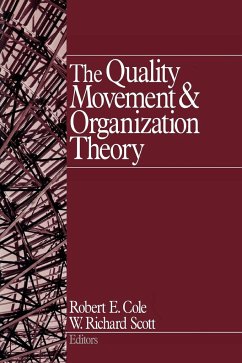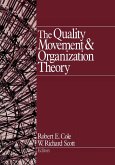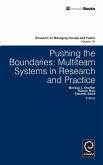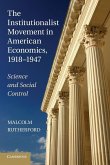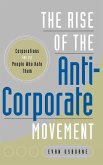- Gebundenes Buch
- Merkliste
- Auf die Merkliste
- Bewerten Bewerten
- Teilen
- Produkt teilen
- Produkterinnerung
- Produkterinnerung
The Quality Movement and Organization Theory is the first comprehensive study of quality management to be linked with the principles of organizational behavior and analysis.The contributors are at the forefront of assessing new quality approaches, how they work, and the conditions under which they are effective. The book bridges the world of theory and practice, making academics aware of recent developments to improve organizational performance and exploring ways in which these efforts both contribute to and challenge current theories.
Andere Kunden interessierten sich auch für
![Quality Movement and Organization Theory Quality Movement and Organization Theory]() Robert E. Cole / W. Richard ScottQuality Movement and Organization Theory124,99 €
Robert E. Cole / W. Richard ScottQuality Movement and Organization Theory124,99 €![Pushing the Boundaries Pushing the Boundaries]() Pushing the Boundaries185,99 €
Pushing the Boundaries185,99 €![The Institutionalist Movement in American Economics, 1918-1947 The Institutionalist Movement in American Economics, 1918-1947]() Malcolm RutherfordThe Institutionalist Movement in American Economics, 1918-194743,99 €
Malcolm RutherfordThe Institutionalist Movement in American Economics, 1918-194743,99 €![The Growth of the Work/Life Movement in Corporate America . . . and the Professionals Who Made It Happen The Growth of the Work/Life Movement in Corporate America . . . and the Professionals Who Made It Happen]() Ann Vincola VottaThe Growth of the Work/Life Movement in Corporate America . . . and the Professionals Who Made It Happen17,99 €
Ann Vincola VottaThe Growth of the Work/Life Movement in Corporate America . . . and the Professionals Who Made It Happen17,99 €![The Rise of the Anti-Corporate Movement The Rise of the Anti-Corporate Movement]() Evan OsborneThe Rise of the Anti-Corporate Movement56,99 €
Evan OsborneThe Rise of the Anti-Corporate Movement56,99 €![The international youth movement and the challenges of information and communication The international youth movement and the challenges of information and communication]() Bouchra Sidi HidaThe international youth movement and the challenges of information and communication18,99 €
Bouchra Sidi HidaThe international youth movement and the challenges of information and communication18,99 €![Financial Freedom Roadmap - Achieving Early Retirement through the FIRE Movement Financial Freedom Roadmap - Achieving Early Retirement through the FIRE Movement]() Alex ThompsonFinancial Freedom Roadmap - Achieving Early Retirement through the FIRE Movement24,99 €
Alex ThompsonFinancial Freedom Roadmap - Achieving Early Retirement through the FIRE Movement24,99 €-
-
-
The Quality Movement and Organization Theory is the first comprehensive study of quality management to be linked with the principles of organizational behavior and analysis.The contributors are at the forefront of assessing new quality approaches, how they work, and the conditions under which they are effective. The book bridges the world of theory and practice, making academics aware of recent developments to improve organizational performance and exploring ways in which these efforts both contribute to and challenge current theories.
Produktdetails
- Produktdetails
- Verlag: Sage Publications, Inc
- Seitenzahl: 456
- Erscheinungstermin: 22. Dezember 1999
- Englisch
- Abmessung: 260mm x 183mm x 29mm
- Gewicht: 1048g
- ISBN-13: 9780761919759
- ISBN-10: 0761919759
- Artikelnr.: 21813493
- Verlag: Sage Publications, Inc
- Seitenzahl: 456
- Erscheinungstermin: 22. Dezember 1999
- Englisch
- Abmessung: 260mm x 183mm x 29mm
- Gewicht: 1048g
- ISBN-13: 9780761919759
- ISBN-10: 0761919759
- Artikelnr.: 21813493
W. Richard (Dick) Scott (Ph.D., University of Chicago) is a Professor Emeritus in the Department of Sociology with courtesy appointments in the Graduate School of Business, School of Education, and School of Medicine, Stanford University. He has spent his entire professional career at Stanford and served as the founding director of the Stanford Center for Organizations Research. He is the author of many articles and more than a dozen scholarly books, including two widely used texts in the area of organizations: an early book, Formal Organizations (1962), coauthored with Peter M Blau, and the more recent volume, Organizations: Rational, Natural and Open Systems (1981/1987/1992/1998), now in its 4th edition. Scott is a past fellow of the Center for Advanced Study in the Behavioral Sciences, and was the recipient in 1988 of the Distinguished Scholar Award from the Management and Organization Theory Division of the Academy of Management. In 1996, he received the Richard D. Irwin Award for Scholarly Contributions to Management from the Academy of Management.
Introduction - W Richard Scott and Robert E Cole
PART ONE: QUESTIONS AND CONCERNS FROM ORGANIZATION THEORY: THREE
FOUNDATIONAL PAPERS
Management Theory and Total Quality - James W Dean Jr and David E Bowen
Improving Research and Practice Through Theory Development
Total Quality Management - J Richard Hackman and Ruth Wageman
Empirical, Conceptual and Practical Issues
Organizing for Continuous Improvement - Sidney G Winter
Evolutionary Theory Meets the Quality Revolution
PART TWO: THE QUALITY MOVEMENT IN AMERICA
Market Pressures and Institutional Forces - Robert E Cole
The Early Years of the Quality Movement
Patterns in the Deployment of Total Quality Management - George S Easton
and Sherry L Jarrell
An Analysis of Forty-four Leading Companies
Quality Comes to the Public Sector - Linda Kaboolian
Quality Improvement - Karl E Weick
A Sensemaking Perspective
PART THREE: STAGES AND PROCESSES IN QUALITY IMPROVEMENT
The Road to "Root Cause" - John Paul MacDuffle
Shop-Floor Problem-Solving at Three Auto Assembly Plants
Getting Quality the Old-Fashioned Way - Nelson P Repenning and John D
Sterman
Self-Confirming Attributions in the Dynamics of Process Improvement
The Effects of Total Quality Management on Corporate Performance - George S
Easton and Sherry L Jarrell
An Empirical Investigation
Organization Quality as a Cultural Variable - Kim S Cameron and Carole K
Barnett
An Empirical Investigation of Quality Cultures
Quality as a Cultural Concept - Tomoko Hamada
Messages and Meta-Messages
PART FOUR: CONDITIONS AND CONTINGENCIES AFFECTING QUALITY DEVELOPMENT
Tailoring Process Management to Situational Requirements - Kathleen M
Sutcliffe, Sim B Sitkin and Larry D Browning
Beyond the Control and Exploration Dichotomy
Speed and Quality in New Product Development - Andrew B Hargadon and
Kathleen M Eisenhart
An Emergent Perspective on Continuous Organizational Adaptation
Quality Improvement Practices and Innovative HRM Practices - Casey
Ichniowski and Kathryn Shaw
New Evidence on Adoption and Effectiveness
The Incentives of Quality and the Quality of Incentives - David I Levine
and Kathryn Shaw
Quality Improvement and Incentive Pay for Frontline Workers
Human Resource Policies and Quality - Thomas A Kochan and Saul Rubinstein
From Quality Circles to Organizational Transformation
PART ONE: QUESTIONS AND CONCERNS FROM ORGANIZATION THEORY: THREE
FOUNDATIONAL PAPERS
Management Theory and Total Quality - James W Dean Jr and David E Bowen
Improving Research and Practice Through Theory Development
Total Quality Management - J Richard Hackman and Ruth Wageman
Empirical, Conceptual and Practical Issues
Organizing for Continuous Improvement - Sidney G Winter
Evolutionary Theory Meets the Quality Revolution
PART TWO: THE QUALITY MOVEMENT IN AMERICA
Market Pressures and Institutional Forces - Robert E Cole
The Early Years of the Quality Movement
Patterns in the Deployment of Total Quality Management - George S Easton
and Sherry L Jarrell
An Analysis of Forty-four Leading Companies
Quality Comes to the Public Sector - Linda Kaboolian
Quality Improvement - Karl E Weick
A Sensemaking Perspective
PART THREE: STAGES AND PROCESSES IN QUALITY IMPROVEMENT
The Road to "Root Cause" - John Paul MacDuffle
Shop-Floor Problem-Solving at Three Auto Assembly Plants
Getting Quality the Old-Fashioned Way - Nelson P Repenning and John D
Sterman
Self-Confirming Attributions in the Dynamics of Process Improvement
The Effects of Total Quality Management on Corporate Performance - George S
Easton and Sherry L Jarrell
An Empirical Investigation
Organization Quality as a Cultural Variable - Kim S Cameron and Carole K
Barnett
An Empirical Investigation of Quality Cultures
Quality as a Cultural Concept - Tomoko Hamada
Messages and Meta-Messages
PART FOUR: CONDITIONS AND CONTINGENCIES AFFECTING QUALITY DEVELOPMENT
Tailoring Process Management to Situational Requirements - Kathleen M
Sutcliffe, Sim B Sitkin and Larry D Browning
Beyond the Control and Exploration Dichotomy
Speed and Quality in New Product Development - Andrew B Hargadon and
Kathleen M Eisenhart
An Emergent Perspective on Continuous Organizational Adaptation
Quality Improvement Practices and Innovative HRM Practices - Casey
Ichniowski and Kathryn Shaw
New Evidence on Adoption and Effectiveness
The Incentives of Quality and the Quality of Incentives - David I Levine
and Kathryn Shaw
Quality Improvement and Incentive Pay for Frontline Workers
Human Resource Policies and Quality - Thomas A Kochan and Saul Rubinstein
From Quality Circles to Organizational Transformation
Introduction - W Richard Scott and Robert E Cole
PART ONE: QUESTIONS AND CONCERNS FROM ORGANIZATION THEORY: THREE
FOUNDATIONAL PAPERS
Management Theory and Total Quality - James W Dean Jr and David E Bowen
Improving Research and Practice Through Theory Development
Total Quality Management - J Richard Hackman and Ruth Wageman
Empirical, Conceptual and Practical Issues
Organizing for Continuous Improvement - Sidney G Winter
Evolutionary Theory Meets the Quality Revolution
PART TWO: THE QUALITY MOVEMENT IN AMERICA
Market Pressures and Institutional Forces - Robert E Cole
The Early Years of the Quality Movement
Patterns in the Deployment of Total Quality Management - George S Easton
and Sherry L Jarrell
An Analysis of Forty-four Leading Companies
Quality Comes to the Public Sector - Linda Kaboolian
Quality Improvement - Karl E Weick
A Sensemaking Perspective
PART THREE: STAGES AND PROCESSES IN QUALITY IMPROVEMENT
The Road to "Root Cause" - John Paul MacDuffle
Shop-Floor Problem-Solving at Three Auto Assembly Plants
Getting Quality the Old-Fashioned Way - Nelson P Repenning and John D
Sterman
Self-Confirming Attributions in the Dynamics of Process Improvement
The Effects of Total Quality Management on Corporate Performance - George S
Easton and Sherry L Jarrell
An Empirical Investigation
Organization Quality as a Cultural Variable - Kim S Cameron and Carole K
Barnett
An Empirical Investigation of Quality Cultures
Quality as a Cultural Concept - Tomoko Hamada
Messages and Meta-Messages
PART FOUR: CONDITIONS AND CONTINGENCIES AFFECTING QUALITY DEVELOPMENT
Tailoring Process Management to Situational Requirements - Kathleen M
Sutcliffe, Sim B Sitkin and Larry D Browning
Beyond the Control and Exploration Dichotomy
Speed and Quality in New Product Development - Andrew B Hargadon and
Kathleen M Eisenhart
An Emergent Perspective on Continuous Organizational Adaptation
Quality Improvement Practices and Innovative HRM Practices - Casey
Ichniowski and Kathryn Shaw
New Evidence on Adoption and Effectiveness
The Incentives of Quality and the Quality of Incentives - David I Levine
and Kathryn Shaw
Quality Improvement and Incentive Pay for Frontline Workers
Human Resource Policies and Quality - Thomas A Kochan and Saul Rubinstein
From Quality Circles to Organizational Transformation
PART ONE: QUESTIONS AND CONCERNS FROM ORGANIZATION THEORY: THREE
FOUNDATIONAL PAPERS
Management Theory and Total Quality - James W Dean Jr and David E Bowen
Improving Research and Practice Through Theory Development
Total Quality Management - J Richard Hackman and Ruth Wageman
Empirical, Conceptual and Practical Issues
Organizing for Continuous Improvement - Sidney G Winter
Evolutionary Theory Meets the Quality Revolution
PART TWO: THE QUALITY MOVEMENT IN AMERICA
Market Pressures and Institutional Forces - Robert E Cole
The Early Years of the Quality Movement
Patterns in the Deployment of Total Quality Management - George S Easton
and Sherry L Jarrell
An Analysis of Forty-four Leading Companies
Quality Comes to the Public Sector - Linda Kaboolian
Quality Improvement - Karl E Weick
A Sensemaking Perspective
PART THREE: STAGES AND PROCESSES IN QUALITY IMPROVEMENT
The Road to "Root Cause" - John Paul MacDuffle
Shop-Floor Problem-Solving at Three Auto Assembly Plants
Getting Quality the Old-Fashioned Way - Nelson P Repenning and John D
Sterman
Self-Confirming Attributions in the Dynamics of Process Improvement
The Effects of Total Quality Management on Corporate Performance - George S
Easton and Sherry L Jarrell
An Empirical Investigation
Organization Quality as a Cultural Variable - Kim S Cameron and Carole K
Barnett
An Empirical Investigation of Quality Cultures
Quality as a Cultural Concept - Tomoko Hamada
Messages and Meta-Messages
PART FOUR: CONDITIONS AND CONTINGENCIES AFFECTING QUALITY DEVELOPMENT
Tailoring Process Management to Situational Requirements - Kathleen M
Sutcliffe, Sim B Sitkin and Larry D Browning
Beyond the Control and Exploration Dichotomy
Speed and Quality in New Product Development - Andrew B Hargadon and
Kathleen M Eisenhart
An Emergent Perspective on Continuous Organizational Adaptation
Quality Improvement Practices and Innovative HRM Practices - Casey
Ichniowski and Kathryn Shaw
New Evidence on Adoption and Effectiveness
The Incentives of Quality and the Quality of Incentives - David I Levine
and Kathryn Shaw
Quality Improvement and Incentive Pay for Frontline Workers
Human Resource Policies and Quality - Thomas A Kochan and Saul Rubinstein
From Quality Circles to Organizational Transformation

